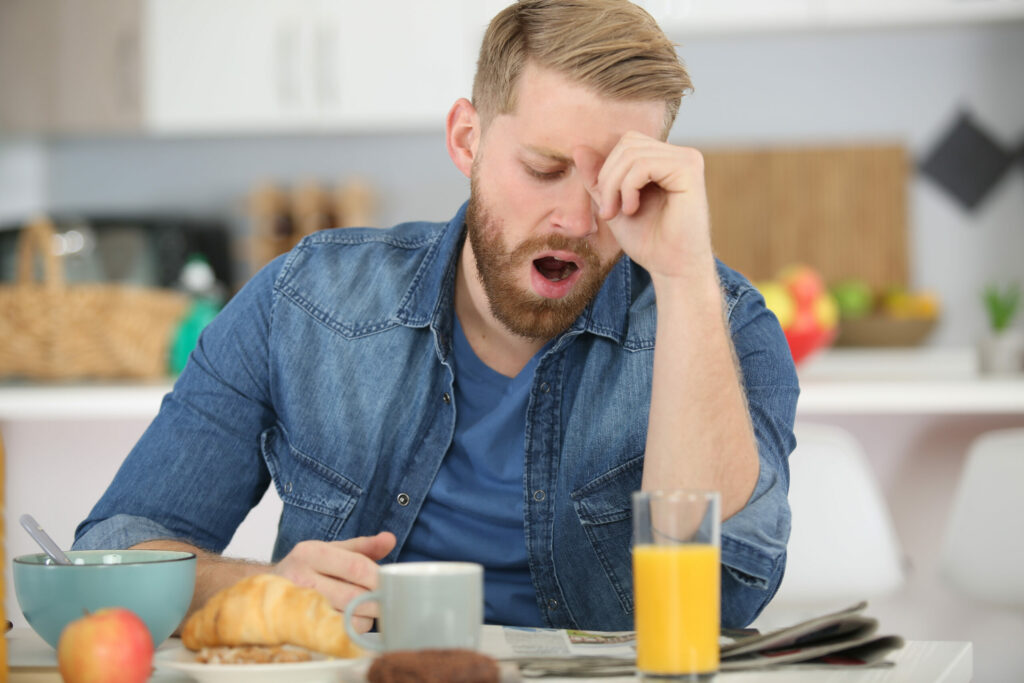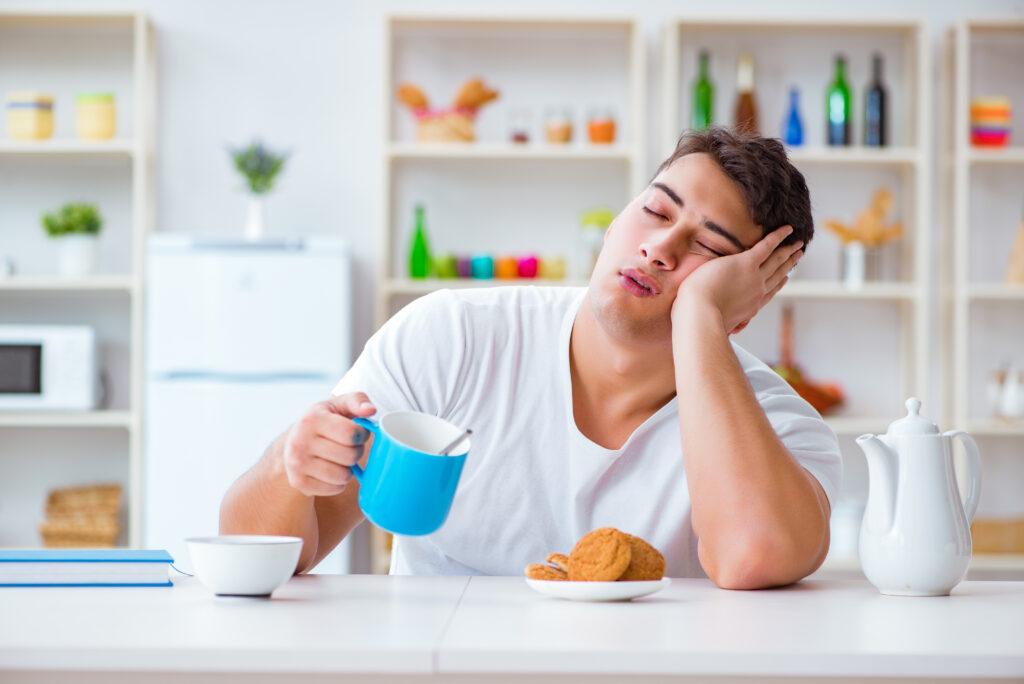Many people experience a sudden wave of drowsiness or fatigue after consuming sugary foods or drinks. A common concern arises; is falling asleep after eating sugar a sign of diabetes? This question often arises when individuals notice themselves feeling unusually tired or lethargic after a sugar intake. In this article, we’ll explore whether this sleepiness is linked to diabetes or if other factors could be at play.
Sugar plays a significant role in the body’s metabolism. Once consumed, it’s broken down into glucose, providing energy for the body’s cells. However, fluctuations in blood sugar levels can lead to feelings of tiredness or sleepiness. But is this merely a natural response to sugar, or could it be an early warning sign of diabetes? We’ll examine the potential connection between falling asleep after eating sugar and diabetes. As well as other possible causes for this post-meal drowsiness. Keep reading to understand the science behind why you may feel sleepy after eating sugar.
How Does Sugar Affect the Body?
When you consume sugar, your body breaks it down into glucose, a simple sugar that serves as the primary energy source for your cells. This glucose enters the bloodstream, raising blood sugar levels. To regulate these levels, the pancreas releases insulin, a hormone that helps transport glucose into cells for energy. However, when this process is disrupted, such as in the case of insulin resistance, the body struggles to manage blood sugar levels effectively.
Insulin resistance occurs when the body’s cells become less responsive to insulin. It forces the pancreas to produce more insulin to achieve the same effect. This leads to higher-than-normal blood sugar levels over time, and the body’s ability to process glucose properly diminishes. This disruption can cause fluctuations in blood sugar, leaving you drowsy after eating. For those with insulin resistance, the resulting tiredness after eating pronounces, especially after consuming sugary or high-carb meals.
Additionally, people with diabetes may find that eating sugar causes them to feel sluggish or tired. This fatigue is often linked to the body’s difficulty managing glucose, leading to feelings of lethargy and discomfort. Why do I get sleepy after eating sugar and carbs? The rapid rise and fall of blood sugar levels after consuming sugar and carbs can trigger this exhaustion, particularly in those with an impaired ability to regulate insulin.
Is Falling Asleep After Eating Sugar a Sign of Diabetes?
Is feeling sleepy after eating sugar a sign of diabetes? While occasional tiredness after a sugary meal isn’t necessarily a cause for concern, it can signal an underlying issue, such as diabetes. When blood sugar levels rise too high (hyperglycemia) or drop too low (hypoglycemia), the body reacts by inducing diabetes fatigue.
These blood sugar fluctuations may cause extreme tiredness after eating sugar for individuals with diabetes. Hyperglycemia occurs when the body can’t effectively use insulin, resulting in high blood sugar. This can make you feel sluggish, thirsty, or excessively hungry. On the other hand, hypoglycemia occurs when blood sugar levels fall too low. It is often due to an overcorrection after a meal or a missed dose of insulin. This can also make you feel very tired, causing sleepiness due to hypoglycemia.
In addition to sleepiness, other diabetes-related symptoms include increased thirst, frequent urination, and constant hunger. If you’re extremely tired after eating sugar and notice these other signs, it’s important to consult a healthcare provider, as this could indicate poorly controlled blood sugar and the need for further testing or treatment.

Why Diabetics May Experience Sleepiness After Eating Sugar?
What causes a diabetic to fall asleep after eating? For those with diabetes, blood sugar spikes and crashes are a common cause of extreme tiredness. When a person with diabetes consumes sugary or high-carb foods, their blood sugar levels may rise quickly. This causes a surge of energy. However, this is often followed by a rapid drop, leading to fatigue and sleepiness. This phenomenon is particularly noticeable in those with insulin resistance, where the body is unable to efficiently process glucose. Thus, causing blood sugar levels to fluctuate significantly.
In people with type 2 diabetes, the body’s ability to regulate insulin becomes impaired. It subsequently leads to frequent blood sugar swings. After eating a sugary meal, they may experience a quick rise in blood sugar, followed by a sudden drop. Thus, resulting in feelings of exhaustion and diabetic feeling tired after eating. These fluctuations can be more pronounced after meals rich in sugar or carbohydrates.
Hypoglycemia vs. Hyperglycemia: Which Causes Fatigue?
Hypoglycemia falling asleep after eating sugar and hyperglycemia are both causes of fatigue but have different underlying mechanisms. Hypoglycemia, or low blood sugar, occurs when there is not enough glucose in the bloodstream to fuel the body’s cells. This can happen if a person with diabetes takes too much insulin or doesn’t eat enough food, causing their blood sugar to drop too low. This leads to feelings of extreme tiredness, shakiness, dizziness, and, in some cases, fainting.
Meanwhile, hyperglycemia, occurs when the body is unable to use insulin properly, resulting in an excess of glucose in the bloodstream. The body responds to this excess glucose by trying to eliminate it through urination, which can lead to dehydration and feelings of tiredness, dizziness, and weakness. Both hypoglycemia and hyperglycemia can cause fatigue, but it’s important to maintain stable blood sugar levels to avoid uncontrollable sleepiness after eating and other related symptoms.
How to Manage Sleepiness After Eating Sugar?
If you’re very tired after eating sugar, managing your sugar intake is key. Eating smaller, more balanced meals throughout the day, including proteins, healthy fats, and fiber, can help prevent blood sugar spikes and crashes. Avoid large portions of sugary foods or refined carbs, which can cause quick fluctuations in blood sugar levels.
To prevent feeling sleepy after eating, consider spacing out sugary foods or pairing them with fiber or protein to slow down sugar absorption. If you regularly experience extreme tiredness after eating sugar, and especially if you suspect it may be related to diabetes, you should see a healthcare provider for proper testing. A blood test, such as the A1C or fasting blood glucose test, can help determine whether you have diabetes or insulin resistance.
When to Seek Medical Advice?
If you experience ongoing tiredness or feeling sleepy after meals, it may be time to consult a healthcare provider. If other symptoms accompany, like increased thirst, frequent urination, or unexplained hunger with subsequent weight gain due to diabetes, you should schedule a visit to discuss potential diabetes testing. Tests such as the HbA1C test or a fasting blood glucose test can help evaluate your blood sugar levels and determine if diabetes or another condition is causing these symptoms.

Conclusion
In summary, while feeling sleepy after eating a sign of diabetes isn’t always definitive, it can be a clue that your body’s blood sugar regulation might be off. If you find yourself feeling tired after eating not diabetic, or if you experience other symptoms such as increased thirst, frequent urination, or hunger, it could be an indication to consult with a healthcare provider. Monitoring your symptoms of diabetes and seeking professional advice can help ensure proper diagnosis and effective management.
If you’re extremely tired after eating sugar or notice fluctuating energy levels, taking steps to balance your meals and understanding your body’s response to sugar can make a significant difference in how you feel.
Always consult with a doctor if you suspect that falling asleep after eating sugar is related to a deeper health issue.
FAQs
Do diabetics get sleepy after eating sugar?
Yes, people with diabetes may feel sleepy after consuming sugar, particularly if their blood sugar levels are unstable. This could be due to high blood sugar (hyperglycemia) or a blood sugar crash (hypoglycemia). If you are diabetic and experience extreme tiredness after eating sugar, it may be worth discussing with your healthcare provider.
Is falling asleep after eating sugar a sign of diabetes?
Feeling sleepy after eating may indicate a potential issue with blood sugar regulation. If you regularly experience fatigue, excessive thirst, or frequent urination in addition to sleepiness after meals, it could be a sign of diabetes. Consult with a doctor for proper diagnosis and blood sugar testing.
How does a diabetic feel after eating sugar?
A diabetic may feel tired, sluggish, or even experience dizziness after eating sugary foods. This is due to fluctuations in blood sugar levels. A sudden spike in blood sugar following a rapid drop can lead to symptoms like fatigue, hunger, and irritability.
Should I be worried if I fall asleep after eating?
Occasional sleepiness after eating is not uncommon, but persistent fatigue or extreme tiredness could indicate an underlying health issue, such as diabetes or another metabolic disorder. If you regularly feel very tired after eating or notice other signs like increased thirst or frequent urination, it’s important to consult a doctor.
Why do I get sleepy after eating sugar and carbs?
After eating sugar or carbs, your body releases insulin to process the glucose. This can lead to fluctuations in blood sugar levels, which can cause tiredness, especially if insulin levels spike or dip too quickly. This effect may be more pronounced in individuals with insulin resistance or diabetes.




